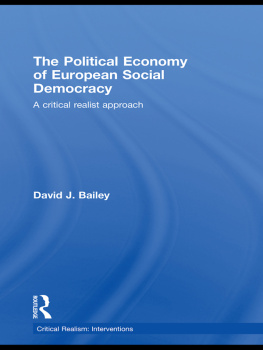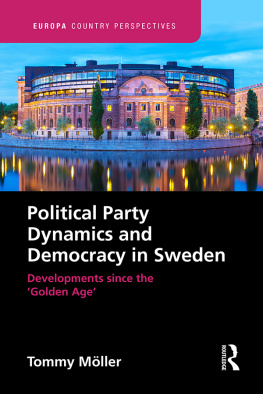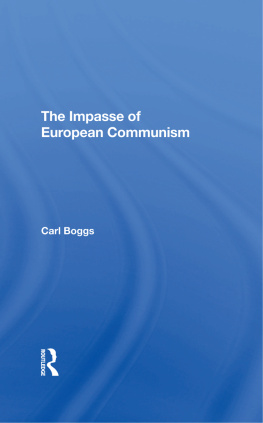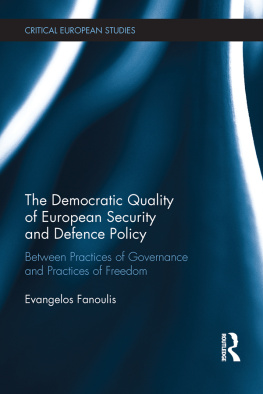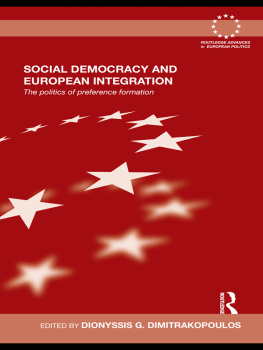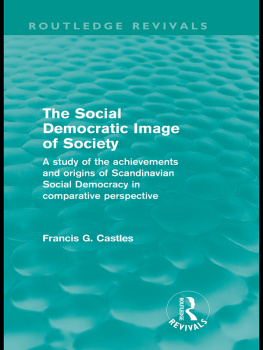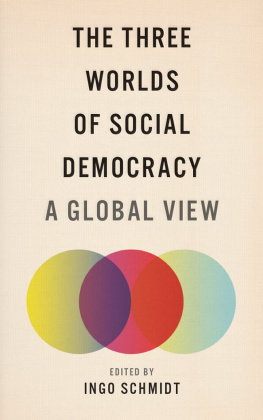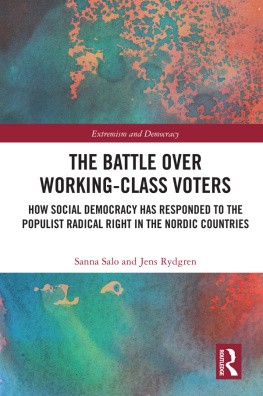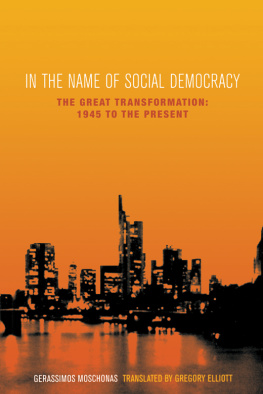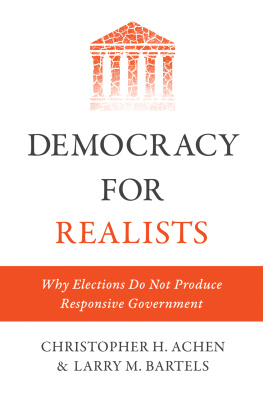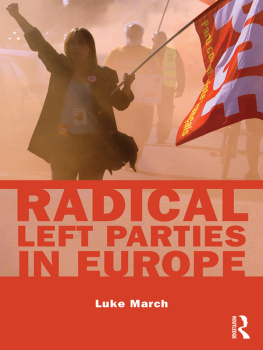The Political Economy of
European Social Democracy
For many years European social democrats have aspired to create a Social Europe to compensate for the ascendance of an international neoliberal consensus. Despite the promises of European integration, however, the European Union has thus far been largely a market-building project. EU-level market-correcting policies have either been curtailed by national opposition (such as the EU Social Chapter) or steered in a market-friendly direction (such as the Lisbon Strategy).
This book argues that rather than presenting an opportunity for European social democrats, the European Union instead provides the appearance of an opportunity, which ensures that new social democratic party initiatives are complicit with the neoliberal international political economy. Included as part of this examination are case studies from the UK, France, Sweden, Spain, Italy and the transnational Party of European Socialists.
Providing a theoretically innovative explanation for the new social democratic turn to Europe, this book will be of interest to postgraduate students and academics focusing on social democratic parties.
David J. Bailey completed his PhD at the London School of Economics, and is currently lecturer in political science at the University of Birmingham. His research focuses on social democratic parties and European integration. He has published articles in the Journal of Common Market Studies, and Comparative European Politics.
Critical realism: Interventions
Other titles in this series:
- (Mis)recognition, Social Inequality and Social Justice
- Nancy Fraser and Pierre Bourdieu
- Edited by Terry Lovell
- After International Relations
- Critical realism and the (re)construction of world politics
- Heikki Patomki
- Being and Worth
- Andrew Collier
- Beyond East and West
- Roy Bhaskar
- Capitalism and Citizenship
- The impossible partnership
- Kathryn Dean
- Critical Realism and Marxism
- Andrew Brown, Steve Fleetwood and John Michael Roberts
- Dictionary of Critical Realism
- Edited by Mervyn Hartwig
- A Social Theory of the Nation-State
- The political forms of modernity beyond methodological nationalism
- Daniel Chernillo
- Rethinking Marxism
- From Kant and Hegel to Marx and Engels
- Jolyon Agar
- Transcendence
- Critical realism and God
- Margaret S. Archer, Andrew Collier and Douglas V. Porpora
The Political Economy of European Social Democracy
A critical realist approach
David J. Bailey
First published 2009
by Routledge
2 Park Square, Milton Park, Abingdon, Oxon, OX14 4RN
Simultaneously published in the USA and Canada
by Routledge
270 Madison Avenue, New York, NY 10016
Routledge is an imprint of the Taylor & Francis Group, an informa business
This edition published in the Taylor & Francis e-Library, 2009.
To purchase your own copy of this or any of Taylor & Francis or Routledges collection of thousands of eBooks please go to www.eBookstore.tandf.co.uk.
2009 David J. Bailey
All rights reserved. No part of this book may be reprinted or reproduced or utilized in any form or by any electronic, mechanical, or other means, now known or hereafter invented, including photocopying and recording, or in any information storage or retrieval system, without permission in writing from the publishers.
British Library Cataloguing in Publication Data
A catalogue record for this book is available from the British Library
Library of Congress Cataloging in Publication Data
A catalog record for this book has been requested
ISBN 0-203-86766-1 Master e-book ISBN
ISBN10: 0-415-46213-4 (hbk)
ISBN10: 0-203-86766-1 (ebk)
ISBN13: 978-0-415-46213-6 (hbk)
ISBN13: 978-0-203-86766-2 (ebk)
For my parents
Acknowledgements
This book is the product of a long research project that began with my PhD thesis. As a result, I owe a deep debt of gratitude to a number of people who helped me throughout this process. My PhD supervisors, Simon Hix and Eiko Thielemann, both provided me with invaluable advice, assistance and support for the duration of my PhD studies, often spotting holes in my argument and requiring me to either defend, remove or fill those holes. In the early stages of the thesis Eiko Thielemann provided me with both extremely useful advice on how to actually go about doing a PhD, and the right amount of steering to make sure I could work out for myself what that meant in practice without getting completely lost in the process. During the later stages of writing the thesis Simon Hix consistently and constructively identified weaknesses in my argument, the correction of which, I hope, are reflected in the argument as it now appears in this book. I am also grateful for a series of conversations with a fellow PhD student, Sara Motta, who introduced me to a number of new ideas that I would otherwise not have considered and which ended up having a significant impact upon my own intellectual development. I also wish to acknowledge the extremely detailed and constructive comments of my PhD examiners, Colin Hay and Philippe Marlire, both of whom, based on a very close reading of the text, provided me with positive feedback and very useful advice on how to improve the viability of the argument made herein, for which I am extremely grateful. I am also grateful to the Party of European Socialists for granting me access to their archives, providing me with the opportunity to work in and observe their office in Brussels, and to the individuals who took part in my interviews during my field research in late 2002. I was also fortunate enough to gain a small research grant from the British Academy (SG-48128), which allowed me to travel to each of the non-UK countries that form case studies in the present book, to interview leading political actors in each case. I am extremely grateful to the interviewees in each country, the British Academy, and the assistance I received from Magalie Bourblanc, Claudio Corradetti, Borja Lasheras, and Tove Linden. For reading and critically commenting in depth on a number of earlier drafts of this work, I am grateful to Abby Innes, Sebastian Balfour, Bob Hancke, the students who attended GV502 European Politics and Policy, and the anonymous Routledge reviewer. I also acknowledge ESRC award R42200034145. I am also grateful for the chance to discuss some of the claims of the book with Luis Cabrera, who was particularly insightful in pointing me towards the way someone more optimistic about the prospects of European integration might engage with the argument. I am absolutely indebted to Saori Shibata, without whose constant and unwavering support this book is one of many things I would never otherwise have achieved. Finally, I dedicate the book to my parents, who did so much to provide me with the initial conditions necessary to engender an enjoyment of study, for which I will always be grateful.
List of abbreviations
AES Alternative Economic Strategy
AEU Amalgamated Engineering Union
AMS National Labour Market Board
BLP British Labour Party
CAP Common Agricultural Policy

